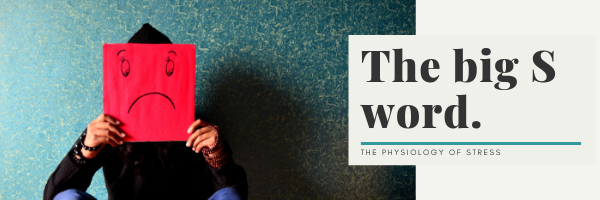“I don’t really have any stress in my life.” “Oh do you live in a bubble with everything you could ever need and want?”
Stress is all around us. It is what gets us out of bed in the morning.
Some of us deal with stress better than others.
Put two people in the same environment. Give them the same outrageous amount of work. One may excel and get through that work efficiently and in a calm manner. The other? Well they have already had a mild break down, achieved minimal at most and left to have a restless nights sleep.
THE PHYSIOLOGY OF STRESS
We all manage stress differently. We all have our own coping strategies. Unfortunately for some of us, that stress (however mild, severe or seemingly nonchalant) can be wreaking havoc on our physiology.
Take this example: you have had possibly 1 cup more coffee than you usually do, you probably havent had lunch yet and as a result you have the old shaking hands effect going on. This type of response would make playing the game ‘Operation’ very difficult. The shaking is a direct result of stress. That extra coffee, and the lack of food, has put your body into a stress state. Your cortisol and adrenaline levels (stress hormones) have increased, your heart rate is elevated, as is your blood pressure. You may be feeling a little warmer, you may even be perspiring slightly. These physiological responses to stress happen whether you have had too much coffee, have started an exercise session, or your brain is simply going a million miles an hour. Sometimes we can physically see the stress (shaking hands), other times it is not as noticeable.
Physical stress (such as exercise or manual labour), emotional stress (anxiety or depressive type feelings), or perceived stress (needing to get things done in a hurry, or a brain that won’t switch off) result in the same physiological response within our bodies. The world we live in today is fast paced, results driven, and presently disconnected (thanks in large part to technology and social media). Therefore our stress often comes in multiple forms, several times during the day. Some days worse than others.
Acute or short term stress and its subsequent effect on our physiology help us to get stuff done.
But…
What happens when that stress becomes our ever present, constant companion? What happens when our bodies are constantly in this elevated, stress induced state? They burn out. Inflammation takes over, and we become susceptible to disease, injury and ultimately: death.
Stress is an independent risk factor for heart disease.
I LEAD A HEALTHY LIFESTYLE THO?
An apparently healthy person is someone who generally looks after themself; they exercise regularly, eat a well balanced diet, do not have any issues with their blood pressure or cholesterol, and do not have any known health concerns. But this apparently healthy person works 10 hours a day in a fast paced job, has young children, a mortgage, gets about 6 hours of sleep a night (or less) and is training for a half marathon. This person does not ever sit still.
This person could have a heart attack.
You do not have to have any of the “normal” risk factors for heart disease to end up with severe heart issues including arrhthmia’s, or a heart attack. If your stress is present for long enough, it can have a significantly negative impact on your heart (not to mention what it is doing to the rest of your body).
HOW DO WE MEASURE OUR STRESS THEN?
We cannot measure stress like we do with heart rate or blood pressure. When you have an ECG (heart scan) at your doctors it is likely done while you are sitting or lying down (relaxed!). So how do we find out how your body and heart are truly responding to stress?
We have developed a treadmill test that allows us to examine how efficiently your heart and body respond under low to moderate levels of stress. As explained above, physical stress (like walking on a treadmill) can impart the same physiological responses in the body and heart to other forms of day to day stress. The results from this test give a strong indicator of how well, or poorly, your body is truly managing stress.
Too often what the body says is significantly different from what our minds may be telling us.
The result of the test can inform a plan to help improve your bodies management of stress. The effectiveness of this plan is determined through subsequent tests, and most noticeably through your own improvement in feelings of general well-being and overall health. The most important factor in achieving this of course is your ability to stick to that plan!
We cannot get rid of stress (although we have now had 2 people quit their jobs as a result of their consultation…!), however we can improve the way our bodies manage stress. Sometimes all it takes are a few small changes to our daily routine to significantly minimise our risk of further or future health complications.
We only have one body, one heart and one life. Why wait until something goes wrong before addressing the cause or wishing we had done something sooner? Take control and ownership of your own health. Book in for a stress assessment and start making changes to toward a healthier you.


 .
.